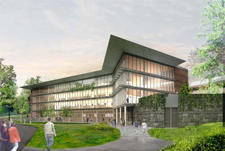NEH grant will foster programming in the Mandel Center for the Humanities

Artist rendering of the Mandel Center for the Humanities
At a time when the humanities face shrinking budgets in higher education, Brandeis University announced the award of a highly competitive $600,000 challenge grant from the National Endowment for the Humanities (NEH) for innovative programming in the new Mandel Center for the Humanities. Through fundraising and donations, Brandeis will match the NEH grant threefold, yielding a total of $2.4 million to support interdisciplinary programs and scholarship in the humanities and social sciences.
The award comes less than one year after the university began construction on the Mandel Center for the Humanities, a visionary initiative to preserve and strengthen humanistic inquiry, a critical, yet embattled, area in higher education. Through its programming, teaching, and research scholarship, the Mandel Center will integrate interdisciplinary work across the humanities and the humanistic social sciences. The challenge grant will help make that possible.
“Brandeis University’s application was quite strong,” said Stephen Ross, director of the challenge grant program at NEH. In this quarterly grant cycle, of 113 challenge-grant applications nationally, only 20 were granted, he said.
In all, the federal agency provided $20 million in grant awards for 319 humanities projects across the nation. The $600,000 challenge grant represents almost one-third of the $2.2 million in awards made to Bay state institutions, and was the second largest challenge grant in the state, according to the NEH. The agency’s evaluators praised the Mandel Center for promising to become not only a “hub” for the university, but for the entire region and, possibly, the nation.
“This grant is a tremendous vote of affirmation for the humanities at Brandeis, and for our commitment to interdisciplinary conversations across the campus,” said Ramie Targoff, professor of English and director of the Mandel Center. “We have already been given a wonderful new building, and now we have the means to bring that building to life—with conferences, lectures, interdisciplinary seminars, faculty colloquia, and other events that will make visible the strength of the humanities and humanistic social sciences on our campus.”
The NEH funds, in concert with matching donations up to $1.8 million, will support a variety of initiatives, including faculty and course development, teaching, and a postdoctoral fellowship. But perhaps the boldest program the grant will help support is DELVE—Dialogue, Engagement, and Leadership through Values and Ethics. Under this program, a leadership team of faculty and students will identify a question of global significance to explore. A sample topic could be individuality and privacy in the genomic age. Over time the topics will change.
This programmatic approach leverages the university’s interdisciplinary, collaborative strengths, and its dedication to social justice. It also reflects a common acknowledgement that deeply understanding and solving humanistic problems in the twenty-first century, from poverty to power, from religion to race, requires studying more than one discipline.
“This award ratifies our faculty’s vision for a new kind of center that draws together undergraduates, graduate students, faculty and the wider community into broad and deep scholarship and learning about the connections among language, society, culture,” said Adam Jaffe, Dean of Arts and Sciences and Fred C. Hecht Professor of Economics.
The Mandel Center for the Humanities will encourage the free flow of students, faculty members, research, and ideas in its mission and its architecture; the center will physically connect freestanding buildings in the humanities quadrangle. It will foster original, interdisciplinary undergraduate courses, and offer increased opportunities for students to participate in research that incorporates multifaceted subject matter.
“The fact that we were able to win this grant in the current economic climate makes it even more remarkable, and we are determined to make the Mandel Center a hub of activity for students, faculty and for the community at large,” said Targoff.





